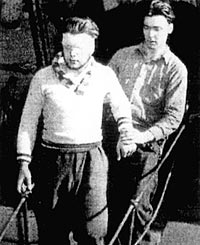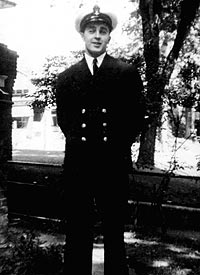by Phil Egan in First Monday

Joe Egan escorts German prisoner off gangway of HMCS Prince Rupert in St. John’s, Newfoundland, 1944. Fifteen German prisoners were turned over to RCMP for internment.
(2015) On a summer day in a small town in Germany, two old men sit on a patio, drinking beer. The taller man’s hair is pure white. The other man is his houseguest. His hair is thin and grey. They smile at each other as they chat; two old warriors talking of family and home. The night before they were partying, singing songs, dancing with each other’s wives.
But on a cold day in March, forty-eight years earlier, they were desperately trying to kill each other, firing point blank at each other across a few hundred yards of frigid Atlantic waves.
It is one of the more heartwarming, and treasured stories born of the Second World War – treasured, at least, by my family because of the profound effect it had on my father.
Joe Egan was only 20 years old when he enlisted in the Royal Canadian Navy in 1942. The navy needed electricians, and he was ultimately posted to the river-class frigate HMCS Prince Rupert; a Petty Officer and electrical artificer. Prince Rupert was assigned to the perilous task of patrolling the grim North Atlantic sea lanes, on convoy escort.
On the other side of the ocean, a young German sailor named Wolfgang Boehmer, also in his early 20s, was taking command of U-575, the German submarine nicknamed “Lilliput.” Commissioned in June of 1942, U-575 would become one of the Kriegsmarine’s deadliest submarines. On 10 patrols over 463 days, U-575 took part in 18 separate wolfpacks, sinking 8 ships and badly damaging three others.
On March 10, 1944, Boehmer’s U-575 sank the British warship HMS Asphodel, killing all but five of her 97-man crew. She was a famed example of German submarine prowess and had earned a reputation as a “lucky” ship. U-575 had, on the day she sank HMS Asphodel, already survived 188 bombings and depth charge attacks.
Following the sinking of Asphodel, the submarine was hunted for 18 hours by convoy escorts, but once again managed to escape. But Boehmer’s luck was running out.
In the early morning hours of March 13, 1944, an RAF Vickers Wellington aircraft spotted U-575 north of the Azores and sounded the alarm. Two American destroyers, USS Hobson and USS Haverfield, raced to the scene. HMCS Prince Rupert was detached from convoy escort to join the hunt.
As the three ships began dropping depth charges, two B-17 Flying Fortresses and a TBM Avenger from USS Bogue began dropping bombs from above. Hours later, trapped and damaged, U-575 surfaced. Men streamed onto her decks, firing deck guns at the sub’s tormentors. Eighteen German sailors were killed. Thirty-seven survivors were rescued from the freezing waters by the Allied warships. My father helped some of them over the rails of Prince Rupert, then spent the next ten days guarding them with a sten gun.
Two haughty enemy officers aboard Prince Rupert demanded to be given separate quarters from their fellow captors, so my father explained that the Prince Rupert crew happily put them in the hottest place they could find aboard ship. Meanwhile, the ordinary German sailors, who expected to be dealt with harshly, were treated to cokes, cigarettes, and a strange sort of brotherly camaraderie. The Canadians knew that their captives weren’t fanatical Nazis – just young sailors doing their jobs.
My father spent more time with them than most. Forty-eight years later, the remarkable invitation came as the men of the Prince Rupert were invited to attend the 32nd annual reunion of the crew of U-575 in Germany. My parents accepted the invitation, flying to Frankfurt in 1992 and taking a train to Nuremburg.
They stayed at the home of Wolfgang and Rosemarie Boehmer, where they were treated like family.
More than 80% of the U-boat crews who served in the German navy never came home. For this reason, Boehmer told my father, the crew of U-575 treated March 13th like a second birthday. They knew capture meant that they would survive the war, and see their sweethearts and families again.
Some of my Dad’s shipmates, and some Navy Association members, couldn’t abide the idea of “consorting with the enemy,” even though almost half a century had passed and Germany was now a staunch ally.
But for my father, it was time to forget, to reconcile, and to leave the past behind.
Dad brought back videos. There was something almost hauntingly sweet about watching these old enemies smiling and joking with each other, telling their war stories, dancing the polka and singing popular songs of the 40s.
Joe Egan and Wolfgang Boehmer, were once on opposite sides of a deadly war. They’re both gone now, but they died friends.
As we mark Remembrance Day this month, let’s remember all of them – those we lost, but also those who served. We don’t have many of them left.
In his later years, we kidded my father that he’d become a peacenik. But maybe he could see the wisdom of a life that ended with old enemies sitting on a patio on a summer day, sharing the warmth of each other’s company, enjoying a beer.


